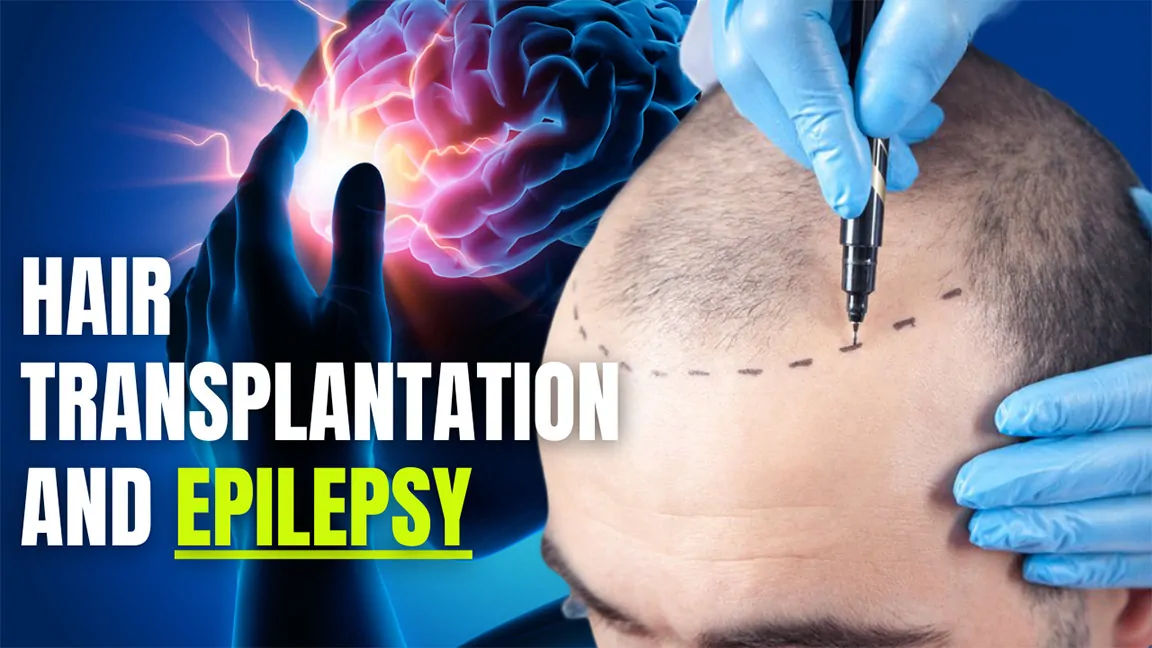Hair transplantation and epilepsy—can they safely coexist?
With major technological advancements in modern hair restoration, many people living with epilepsy wonder if they are suitable candidates for hair transplant surgery.
The good news is that, in most cases, patients with epilepsy can undergo a hair transplant safely when proper medical evaluation and precautions are taken. Let’s explore the relationship between epilepsy and hair transplantation in detail.
What Is Epilepsy?
Epilepsy is a chronic neurological condition that causes recurrent, unprovoked seizures. These seizures result from sudden bursts of electrical activity in the brain.
While some cases are linked to brain injury, genetic predisposition, or infection, many have no clear cause. Having epilepsy does not automatically mean that surgery, such as a hair transplant, is unsafe—what matters is how well the condition is managed.
Can Patients with Epilepsy Get a Hair Transplant?
Yes — patients with epilepsy can have a hair transplant if their condition is well-controlled under medical supervision.
The procedure is performed under local anesthesia, which numbs only the scalp. This means that the medication used does not typically affect the central nervous system, where epileptic activity originates.
However, it’s essential to:
- Inform your hair transplant surgeon about your medical history and medications.
- Obtain clearance from your neurologist before surgery.
- Ensure your epilepsy has been stable for at least 6 to 12 months (ideally 3 years) without seizures.
Patients with uncontrolled or frequent seizures should postpone surgery until their condition stabilizes, as uncontrolled movements during a seizure could cause injury or graft damage.
Safety Precautions for Epileptic Patients Before Hair Transplant
At Quartz Hair Clinic, patient safety is the top priority.
Epileptic patients can safely undergo hair transplantation when certain medical and procedural precautions are taken:
| Precaution | Purpose |
|---|---|
| Neurological consultation | To confirm seizure control and medication compatibility |
| Medication adjustment | Avoid possible interactions between anesthetics and antiepileptic drugs |
| Stable seizure-free period | Preferably seizure-free for 6–12 months before surgery |
| Avoiding stress & fatigue | Stress can trigger seizures—calm environment is crucial |
| Emergency readiness | Clinic should have emergency support and trained staff |
Does Epilepsy Affect Hair Transplant Success?
No — epilepsy does not affect the success rate of hair transplantation when the procedure is performed under controlled conditions.
The surgical area (the scalp) is external and far from the neurological centers affected by epilepsy. Therefore, the condition does not interfere with graft survival or regrowth.
The key factors determining success are:
- Surgeon’s experience
- Donor area quality
- Proper post-operative care
- Patient’s overall health and medication stability
Clinical data show 90–95% graft survival and high satisfaction rates among patients, including those with stable epilepsy.
When Can Epileptic Patients Undergo Hair Transplant Surgery?
Patients who are:
- Seizure-free for at least 6–12 months, and
- Under stable medication management
can safely undergo hair transplantation.
If epilepsy was only present in childhood and there have been no episodes in adulthood, the patient is considered low-risk and eligible for surgery after a neurological evaluation.
Those who have recently had seizures should wait at least 6 months, ideally up to 1 year, before undergoing the procedure.
Can Epileptic Patients Travel for Hair Transplant in Turkey?
Yes — as long as the condition is controlled and travel is approved by their physician.
Patients can safely travel to Istanbul, Turkey, for hair transplantation if:
- Their seizures are stable,
- They carry prescribed medication, and
- They have a medical letter confirming their condition.
When traveling by plane, it’s important to inform the airline if you have epilepsy. For long flights, keep your medication easily accessible, stay hydrated, and avoid fatigue, as lack of sleep or dehydration can trigger seizures.
Recovery and Results After Hair Transplant in Epilepsy Patients
Hair transplant results for epilepsy patients are the same as for non-epileptic individuals.
- 90–95% of transplanted grafts survive and grow naturally.
- The first few weeks include temporary shedding (a normal phase).
- New hair growth begins around 3–4 months after surgery.
- Final results appear within 12–18 months.
Maintaining a healthy lifestyle, avoiding stress, and taking epilepsy medication consistently contribute to faster healing and better outcomes.
Precautions Before Hair Transplant for Epileptic Patients
✅ Epileptic patients can have hair transplants if seizures are well-controlled.
🩺 Always get neurological clearance before surgery.
💊 Inform your surgeon about all medications.
⏳ Wait at least 6–12 months seizure-free before proceeding.
💼 Choose an experienced, medically equipped clinic like Quartz Hair Clinic Istanbul.
Why Choose Quartz Hair Clinic Istanbul?
At Quartz Hair Clinic, our team specializes in performing safe and successful hair transplants for patients with special medical conditions, including epilepsy.
Our advanced DHI and FUE techniques, combined with needle-free anesthesia and sedation options, ensure maximum comfort and safety throughout your procedure.
We maintain close coordination with medical professionals to guarantee that every patient receives the best care tailored to their health status.

